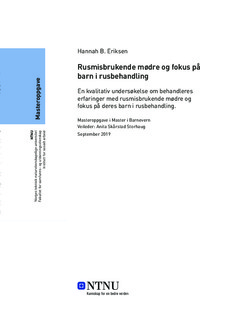| dc.contributor.advisor | Skårstad, Anita Storhaug | |
| dc.contributor.author | Eriksen, Hannah B. | |
| dc.date.accessioned | 2020-03-05T15:00:14Z | |
| dc.date.available | 2020-03-05T15:00:14Z | |
| dc.date.issued | 2019 | |
| dc.identifier.uri | http://hdl.handle.net/11250/2645595 | |
| dc.description.abstract | Masterprosjektet er en kvalitativ studie som omhandler behandleres erfaringer i møte med rusmisbrukende mødre i rusbehandling, og deres barn. Studien søker å finne ut hvilket fokus ulike rusinstitusjoner har på barnet i behandling av mor, og hvordan behandlerne tematiserer morsrollen i samhandling med mødrene. Andre hovedelementer er informantenes forståelse av utfordringer knyttet til å være en god omsorgsperson som rusmisbruker, og behandlernes opplevelse av samarbeidet med barneverntjenesten.
Problemstillingen for studien lyder: Hvilket fokus har man på barnet i behandling av rusmisbrukende mødre? For å presisere problemstillingen har jeg formulert tre forskningsspørsmål: 1.) Hvordan tematiseres rollen som forelder i samhandlingen med mødrene? 2.) Hva forstår behandlerne som de største utfordringene med å være en god omsorgsperson som rusmisbruker? 3.) Hvordan opplever behandlerne samarbeidet med barneverntjenesten?
Prosjektet har sin bakgrunn i ønsket om å tilegne innsikt i hvordan behandlerne, som er tett på mødrene, og ved flere tilfeller også barna, forstår barnas omsorgssituasjon og behov, samt hvilket fokus de har på barna i behandlingen av mor. Masteroppgavens datamateriale er basert på seks semistrukturerte dybdeintervju med seks forskjellige behandlere. Behandlerne arbeider ved fem ulike rusinstitusjoner, og har bred erfaring fra rusfeltet.
Samtlige behandlere uttaler at de har fokus på barnet i behandling av mor. Fokuset framtrer på litt ulikt vis. Ifølge informantene tematiseres morsrollen i stor grad i samhandling med mødrene, og flere vurderer morsrollen som hovedårsaken til rusbehandlingen for mange mødre. I tråd med dette, uttrykker samtlige informanter at målet med behandlingen er å dyktiggjøre mor i foreldrerollen, samtidig som en arbeider med rusmisbruket. I studien finner jeg noen nyanser i rusinstitusjonenes og barneverntjenestens terskel for hva som er «godt nok» for et barn. Ved enkelte tilfeller kan det se ut til at behandlerne omtaler en litt høyere terskel for hva som kan være forsvarlig for et barn å leve med, enn min vurdering av barneverntjenestens terskel. Studien konkluderer med at behandlerne ser når en omsorgssituasjon ikke er god nok, og har et barnefokus i tråd med lovverket. Samarbeidet mellom behandlerne og barneverntjenesten blir beskrevet som godt og viktig, men samtidig ikke helt uproblematisk. Hovedutfordringene ser ut til å være knyttet til manglende kommunikasjon, samt instansenes opplevde forskjellige utgangspunkt og synspunkt for bistanden som skal gis og avgjørelsene som skal tas. | |
| dc.description.abstract | This masters thesis takes the form of a qualitative study about the experiences of therapists working with substance abusing mothers in rehabilitation programs, and their children. The thesis aims to discover the role different rehabilitation institutions attribute to the child when treating the mother, and how the therapists address the role of motherhood when interacting with the women being treated. Other main aspects of the thesis are the interviewees understanding of the challenges tied to being a caretaker of a child while abusing substances, and the therapists experiences of the cooperation with Child Protective Services (CPS).
The problem statement of the thesis is: What focus is given to the child in treatment of a substance abusing mother? To further concretize the problem statement, three research questions are posed below: 1.) How is the role of motherhood addressed when interacting with the mothers? 2.) What do the therapists consider to be the biggest challenges when combining substance abuse with being a good caretaker? 3.) How do the therapists experience the cooperation between themselves and Child Protective Services?
This project stems from a wish to gain insight into how different therapists, who are working directly with the mothers and sometimes children, understand the needs of the child as well as what focus they place upon the child when treating the mother. The thesis builds upon data gathered from six semi-structured interviews with six different therapists. The therapists work at five different rehabilitation institutions and possess wide expertise in the field.
All of the therapists in this study report that the children are a focus when treatment of the mother is concerned. This focus manifests through different means. The interviewees report that motherhood is a central theme when interacting with the mothers, and multiple of them regard the maternal role as the main driver behind the treatment. Following the same line, all of the therapists state the goal of the rehabilitation is to increase the mothers ability to care for her child, while still addressing the substance abuse. In the thesis I discover nuances in what different institutions and CPS classify as adequate care for a child. In some cases it seems like the therapists have a slightly lower bar for adequate care than what I can gather is set by the CPS. The thesis concludes that the therapists identifies when the level of care is not adequate, and that they operate with a standard of care that is within the current legislation. The cooperation between the therapists and CPS is described as both good and important, while not without its challenges. The main challenges seem to be tied to a lack of communication, as well as the different institutions experiencing a wide range of different basis and views of the assistance to be offered and the decisions to be made. | |
| dc.language | nob | |
| dc.publisher | NTNU | |
| dc.title | Rusmisbrukende mødre og fokus på barn i rusbehandling | |
| dc.type | Master thesis | |
